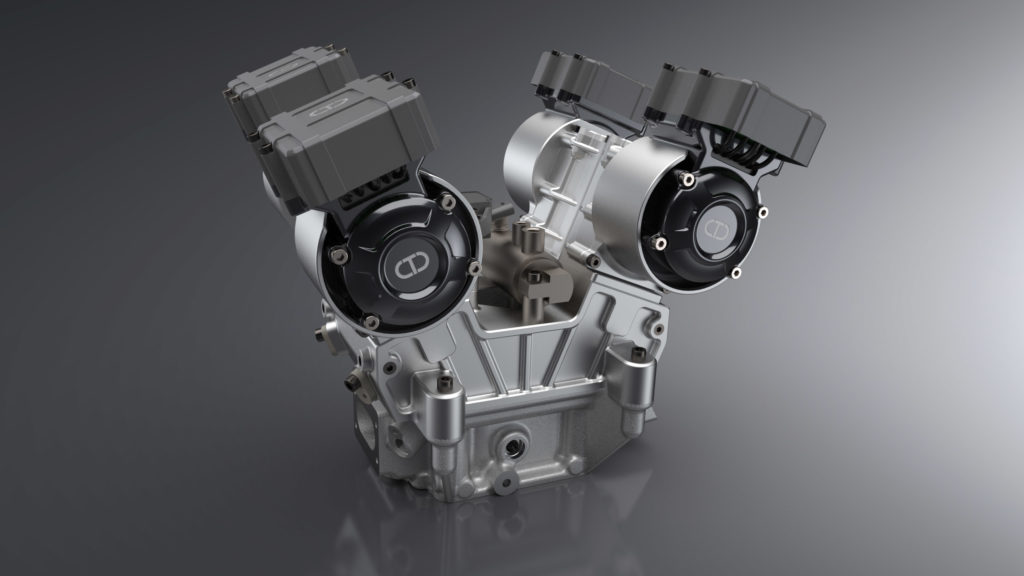
Heavy Duty Diesel truck fleets could save millions of pounds in fuel costs and commercial vehicle OEMs could meet increasingly stringent emissions regulations, by adopting digital engine technology from Camcon Automotive.
Featuring the company’s Intelligent Valve Technology (iVT) at its heart – which replaces the camshaft with electric actuators for full, precise control over the engine’s breathing –combined with innovative software, Camcon Automotive’s cost-effective concept has the potential to make a step change in powertrain development programmes, dramatically reducing fuel consumption and improving control over harmful emissions, without any need for OEMs to invest in electrification.
Neil Butler, Technical Consultant, Camcon Automotive, explained: “All key combustion process parameters have been under digital control for some time now. But breathing has been stuck under the control of increasingly complex but essentially mechanical variable valve train systems. iVT is as big a leap forward as the change from carburettors to electronically controlled fuel injection.”
IVT gives infinite control over the valves, bringing enormous benefits for Heavy Duty Diesel commercial trucks, from cold start emissions performance to exhaust gas recirculation to on-demand cylinder deactivation and management of harmful pollutants, like NOx, which is a major contributor to poor air quality.
To this system, Camcon Automotive’s vision is to incorporate a suite of software that allows iVT to be calibrated through machine learning, combining hardware and software in one package, resulting in the most optimised ICE yet: the digital engine.
With Heavy Duty Diesel truck makers under the same kinds of regulatory pressures that passenger vehicles have been, the focus for the industry is less in terms of CO2 and more on other harmful emissions, such as NOx and particulate matter, both of which impact on air quality. RDE compliance is a huge challenge and many trucks now feature so much after-treatment technology that the equipment can cost more than the actual engine itself.
iVT can be used to reduce the size, weight and cost of the after-treatment equipment fitted to a Heavy Duty Diesel engine very significantly and also to better control the exhaust after-treatment temperature.
Catalysts can be maintained at their optimum operating temperature over a greater proportion of the drive cycle and, while iVT cannot eliminate after-treatment equipment entirely, it can reduce the size and cost and weight. For instance, thanks to the system’s greater optimisation of emissions control, a truck would not need to use as much AdBlue.
But the most significant area is how iVT can also significantly reduce fuel consumption. Camcon Automotive believes it can improve the efficiency of the average Heavy Duty Diesel truck by five percent. For just one truck that would save almost £2,500 a year in diesel*; so for an average fleet of six HGVs, an operator could save £15,000. For a large fleet of 1,000 vehicles, annual fuel costs could be slashed by £2.5m.
Neil Butler continued: “Extrapolated across the entire UK haulage fleet, iVT could save the industry close to half a billion pounds in diesel every year. With more than three million heavy duty diesel trucks sold worldwide and each vehicle having a lifetime of over 10 years it is very easy to see just how much of a massive effect our system could have.
“Another factor to consider is that heavy duty trucks require long ranges as well as rapid unloading and loading – so electrification is a lot further away than it is in the passenger car industry. We believe iVT can reduce running costs, dramatically improve emissions and require no change to the current refuelling infrastructure.”
David Cebon, Director, Centre for Sustainable Road Freight and Professor of Mechanical Engineering at University of Cambridge, said: “Changing the powertrain of cars and trucks is inevitable. What technologies will win in the new era is yet unknown. While the future emerges, it has to be acknowledged that conventional engines will be with us for at least the next decade, and probably a lot longer as part of hybrid drivetrains.
“So, our responsibility is to make them as low-impact to the environment as possible. Technology such as digital control of valve timing – replacing camshafts with electric motors to increase engine efficiency – can make a significant and almost immediate reduction in fuel consumption and emissions, particularly when applied to heavy duty diesel trucks. What’s more, innovation such as this requires no changes to existing infrastructure, saves operators money and lessens environmental impact.”
About Camcon Automotive
Camcon Automotive is an expert automotive engineering company based in Cambridge, United Kingdom. It has pioneered leading automotive technology in the fields of vehicle braking and transmission, using its patented actuator design. For the last nine years, it has been rapidly developing a new engine valvetrain concept called Intelligent Valve Technology (iVT), which uses its innovative actuator to replace the camshaft, giving greater control of combustion, drastically reducing emissions and improving performance.
Camcon Automotive’s engineering and product development teams are organised through a network of independent consulting engineers. By combining this expertise on a project-by- project basis, Camcon Automotive seeks to ensure the right mix of talent is available on demand.
It combines this structure with a focused strategy of partnering with OEMs at the design phase and delivering new technology through Tier 1 suppliers. Camcon has partnered with substantial OEMs for its programmes, developing products that are ready for the real world. For example, it has demonstrators fitted to vehicles, and engine level integration for its iVT technology.
Technical Consultant Neil Butler is a highly-experienced engineer, who has led and delivered powertrain projects with OEMs as well as Tier 1 and 2 suppliers. Over more than four decades in the automotive industry Butler has held senior engine development positions at Rover Group in the UK and SAIC in China and consulted at a senior level across the world, covering development of gasoline and diesel engines from passenger cars to commercial vehicles. Butler heads up the technical team on the iVT programme.
*Figures based on a Heavy Duty Diesel truck averaging 9mpg, a diesel fuel cost of 115 p/l and an average annual mileage of 85,000









More Stories
Towing Services Explained: 6 Key Facts You Need to Know
Environmental Factors That Influence Ceramic Coating Choices
Professional vs. DIY Tinting: What You Should Know